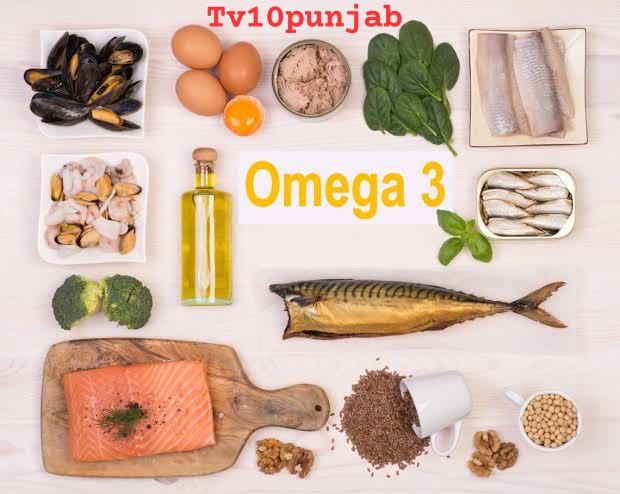TV10 Punjab | Health Desk
🌿 What is Omega-3?
Omega-3 is a type of healthy fat that is very important for your body. It is called an “essential fatty acid,” which means your body cannot make it on its own. You must get it from food or supplements. Omega-3 plays a big role in keeping your heart, brain, eyes, and joints healthy.

🧠 Why is Omega-3 Important?
Omega-3 fatty acids are like fuel for your body and brain. Here are some of the main benefits:
- Heart Health – Omega-3 helps reduce the risk of heart disease by lowering bad cholesterol (LDL), raising good cholesterol (HDL), and controlling blood pressure.
- Brain Function – It supports brain development and memory. It may reduce the risk of Alzheimer’s and depression.
- Eye Health – Omega-3 helps in protecting your vision and may slow age-related eye problems.
- Joint Health – It reduces inflammation in the body and may help in arthritis and joint pain.
- Skin Health – Omega-3 keeps the skin soft, smooth, and hydrated.
- Pregnancy Support – It helps in the brain development of the baby during pregnancy.
🥦 Types of Omega-3 Fatty Acids
There are mainly three types of Omega-3:
- ALA (Alpha-linolenic acid) – Found in plant sources like flaxseeds, chia seeds, and walnuts.
- EPA (Eicosapentaenoic acid) – Found in fatty fish and fish oil.
- DHA (Docosahexaenoic acid) – Also found in fish oil and is most important for brain and eye health.
Your body can convert ALA into EPA and DHA, but in very small amounts. That’s why it’s better to get EPA and DHA directly from fish or supplements.
🐟 Best Food Sources of Omega-3
Here are some foods rich in Omega-3:
✔️ Non-Vegetarian Sources:
Salmon
Sardines
Tuna
Mackerel
Cod liver oil
Anchovies
Oysters
Fish oil capsules
✔️ Vegetarian Sources:
Flaxseeds and flaxseed oil
Chia seeds
Walnuts
Soybeans and tofu
Hemp seeds
Canola oil
Algae oil (a good DHA source for vegetarians)
Mustard seeds
🍴 How Much Omega-3 Do You Need?
The daily need for Omega-3 depends on age, gender, and health condition. On average:
Adults: 250–500 mg of combined EPA and DHA per day
Pregnant or breastfeeding women: 300–900 mg per day
Children: Varies by age, generally 50–100 mg per day
If you’re vegetarian, make sure to include ALA-rich foods daily and consider an algae-based DHA supplement.
💊 Should You Take Omega-3 Supplements?
If you don’t eat fish or Omega-3-rich foods regularly, a supplement may be helpful. Omega-3 capsules are available in fish oil or vegetarian options (like algae oil). But always consult a doctor before starting any supplement, especially if you are taking blood thinners or have a health condition.
⚖️ Omega-3 vs. Omega-6: The Balance Matters
Modern diets are often too high in Omega-6 (from oils like sunflower, corn, and soy) and low in Omega-3. This imbalance can increase inflammation in the body. To stay healthy, try to eat more Omega-3 foods and less processed foods rich in Omega-6.
⚠️ Signs You May Need More Omega-3
Here are some signs that your body may lack enough Omega-3:
Dry and rough skin
Mood swings or depression
Poor memory or focus
Joint pain or stiffness
Eye dryness or vision problems
Fatigue or sleep issues
If you have these symptoms often, consider improving your diet or consulting a nutritionist.
🥗 Easy Ways to Add Omega-3 to Your Diet
Here are some simple tips:
Sprinkle flaxseeds or chia seeds on your breakfast or salad
Eat walnuts as a snack
Cook with canola or mustard oil
Eat fish 2-3 times a week if you are non-vegetarian
Try Omega-3-rich smoothies with chia or flaxseed
Use fortified foods like Omega-3 eggs or milk if available
👩⚕️ Final Thoughts
Omega-3 is one of the most important nutrients your body needs to stay healthy. It protects your heart, brain, skin, and joints and plays a vital role in overall wellness. Whether you eat fish or follow a plant-based diet, there are many ways to include Omega-3 in your meals. Make small changes in your diet today for a healthier tomorrow